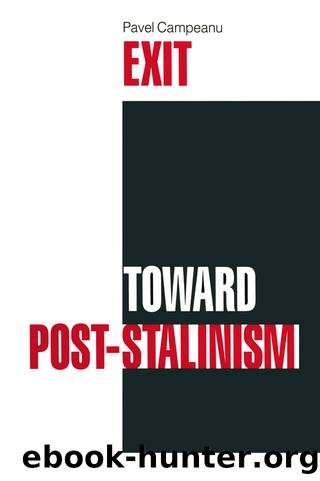Exit Toward Post-Stalinism by Pavel Compenau

Author:Pavel Compenau [Compenau, Pavel]
Language: eng
Format: epub
Tags: Social Science, Folklore & Mythology, Political Science, General
ISBN: 9781315491158
Google: A0dnDwAAQBAJ
Goodreads: 31317360
Publisher: Routledge
Published: 2016-07-22T00:00:00+00:00
1.2. The depolitization of power
Economization is only one level, if a cardinal one, of the metamorphosis of political power into a global regulator; the other level, no less relevant, is that of its depolitization. While economization represents the positive aspect of this processâreferring to the traits which power assumesâdepolitization relates to its negative aspect, i.e., the traits which power loses. In actuality, the process takes place simultaneously at the two levels. In measure as political power becomes the central mechanism of economic activity, the structures of power themselves undergo a complementary transformation. However, what is intended is not a synchronism of two parallel movements, but two referential aspects of the same movement.
This metamorphosis is a subverted and retarded response to a specific necessity created by the incomplete victory of the parent revolution. Long after October 1917 the problem of the revolutionary government remained that of effecting the transition from the constitution of a new viable political power to the constitution of a new viable social organization. The new power held out and consolidated itself in face of the most difficult trials, but with its consolidation its entrapment in politics deepened.
Stalinism succeeded in breaking out of this segregation in the domain of politics by the social devaluation of politics in general. "This period," writes Inkeles, "may be regarded as the second Soviet revolution (the first having been the revolution in the structure of formal power and authority): the social revolution, the revolution in the forms and patterns of social and economic organiza tion."106 To permit the revolution to move beyond the limits of politics, power itself ventured far beyond them. It did not become depolilicized as a consequence of its economization: its depolitization was rather a constituent part of the latter.
Some authors, especially anthropologists, are particularly sensitive to the tendencies of the two spheres, politics and economy, to assimilate one another. Here is Abner Cohen:
But, as Marx and others have indicated, these economic relations are relations of power and are thus essentially political, forming a major part of the political order in every society. Nearly everywhere in civil societies [these relations] are inseparable parts of the political order. . . . This is not to maintain that these two types of power, the economy and the political, are indistinguishable one from the other.... The relationships which they govern are formally regulated by different mechanisms. Political power is ultimately maintained by physical coercion. Economic power is ultimately maintained by reward and deprivations. They are nevertheless intimately interconnected and, in many contexts, inseparable.107
The inference is that the two spheres and, with them, the two types of power, are usually neither totally separated nor totally integrated; that their integration prevails in simple societiesâin any case in preindustrial societies; hence, the implicit probability that industrial societies will be characterized more by the separation of the two spheres and forms of power than by their integration.
The Stalinist organization of society tends toward the utter integration of economic power and political power. Stalinism thus imposes on a
Download
This site does not store any files on its server. We only index and link to content provided by other sites. Please contact the content providers to delete copyright contents if any and email us, we'll remove relevant links or contents immediately.
| Anthropology | Archaeology |
| Philosophy | Politics & Government |
| Social Sciences | Sociology |
| Women's Studies |
The Secret History by Donna Tartt(19012)
The Social Justice Warrior Handbook by Lisa De Pasquale(12179)
Thirteen Reasons Why by Jay Asher(8878)
This Is How You Lose Her by Junot Diaz(6866)
Weapons of Math Destruction by Cathy O'Neil(6253)
Zero to One by Peter Thiel(5778)
Beartown by Fredrik Backman(5723)
The Myth of the Strong Leader by Archie Brown(5488)
The Fire Next Time by James Baldwin(5420)
How Democracies Die by Steven Levitsky & Daniel Ziblatt(5207)
Promise Me, Dad by Joe Biden(5137)
Stone's Rules by Roger Stone(5072)
A Higher Loyalty: Truth, Lies, and Leadership by James Comey(4942)
100 Deadly Skills by Clint Emerson(4907)
Rise and Kill First by Ronen Bergman(4766)
Secrecy World by Jake Bernstein(4735)
The David Icke Guide to the Global Conspiracy (and how to end it) by David Icke(4693)
The Farm by Tom Rob Smith(4496)
The Doomsday Machine by Daniel Ellsberg(4477)
